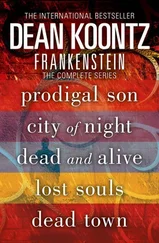“I think we could wind up as crazy as he is, if we tried long enough to puzzle out his twisted logic."
He shook his head. “I think he's evil, not crazy. And stupid in the way that evil often is. Too arrogant and too vain to be aware of his stupidity-and therefore always tangled up in traps of his own making. But nonetheless dangerous for being stupid. In fact, far more dangerous than a wiser man with a sense of consequences."
Tom Vanadium's uninflected but curiously hypnotic voice, his pensive manner, his gray eyes so beautiful in that fractured face, his air of measured melancholy, and his evident intelligence gave him a presence that was simultaneously as solid as a great mass of granite and yet otherworldly.
“Are all policemen as philosophical as you?” Celestina asked.
He smiled. “Those of us who were priests first—yeah, we're all a broody bunch. Of the others—not many, but probably more than you think."
Footsteps in the hall drew their attention to the open door, where the surgeon appeared in his loose cotton greens.
Celestina rose, heart suddenly clumping in her breast, like heavy footsteps hurrying away from an approaching bearer of bad news, but she herself couldn't run, could only stand rooted in her hope-and hear in her mind six versions of a bleak prognosis in the two seconds before the doctor actually spoke.
“He came through the surgery well. He'll be in post-op for a while, then brought here to the ICU. His condition's critical, but there are degrees of critical, and I believe we'll be able to upgrade him to serious long before this day is over. He's going to make it."
This momentous day. In every ending, new beginnings. But, thank God, no ending here.
Freed for the moment from the need to be strong for her sleeping Angel or for Wally, Celestina turned to Tom Vanadium, saw in his gray eyes both the sorrow of the world and a hope to match her own, saw in his ruined face the promise of triumph over evil, leaned against him for support, and finally dared to cry.
IN HIS FORD VAN filled with needlepoint and Sklent and Zedd, Junior Cain-Pinchbeck to the world-left the Bay Area by a back door. He took State Highway 24 to Walnut Creek, which might or might not have walnuts, but which offered a mountain and a state park named for the devil: Mount Diablo. State Highway 4 to Antioch brought him to a crossing of the river delta west of Bethel Island. Bethel, for those who had taken good advanced courses in vocabulary improvement, meant “sacred place."
From the devil to the sacred and then beyond, Junior drove north on State Highway 160, which was proudly marked as a scenic route, although in these predawn hours, all lay bleak and black. Following the serpentine course of the Sacramento River, Highway 160 wove past a handful of small, widely separated towns.
Between Isleton and Locke, Junior first became aware of several points of soreness on his face. He could feel no swelling, no cuts or scrapes, and the rearview mirror revealed only the fine features that had caused more women's hearts to race than all the amphetamines ever manufactured.
His body ached, too, especially his back, from the battering that he had taken. He remembered hitting the floor with his chin, and he supposed that he might have gotten knocked about the face more than he realized or remembered. If so, there would be bruises soon, but bruises would fade with time; in the interim, they might make him even more attractive to women, who would want to console him and kiss away the pain-especially when they discovered that he had sustained his injuries in a brutal fight, while rescuing a neighbor from a would-be rapist.
Nevertheless, when the points of soreness in his brow and cheeks gradually grew worse, he stopped at a service station near Courtland, bought a bottle of Pepsi from a vending machine, and washed down yet another capsule of antihistamines. He also took another antiemetic, four aspirin, and-although he felt no trembling in his bowels-one more dose of paregoric.
Thus armored, he at last arrived in the city of Sacramento, an hour before dawn. Sacramento, which means “sacrament” in Italian and in Spanish, calls itself the Camellia Capital of the World, and holds a ten-day camellia festival in early March-already advertised on billboards now in mid-January. The camellia, shrub and flower, is named for G. J. Camellus, a Jesuit missionary who brought it from Asia to Europe in the eighteenth century.
Devil mountains, sacred islands, sacramental rivers and cities, Jesuits: These spiritual references at every turn made Junior uneasy. This was a haunted night, no doubt about that. He wouldn't have been greatly surprised if he had glanced at his rearview mirror and seen Thomas Vanadium's blue Studebaker Lark Regal closely tailing him, not the real car raised from Quarry Lake, but a ghostly version, with the filthy-scabby-monkey spirit of the cop at the wheel, an ectoplasmic Naomi at his side, Victoria Bressler and Ichabod and Bartholomew Prosser and Neddy Gnathic in the backseat: the Studebaker packed full of spirits like a bozo-stuffed clown car in a circus, though there would be nothing funny about these revenge-minded spooks when the doors flew open and they came tumbling out.
By the time he reached the airport, located a private-charter company, chased up the owner through the night-security man, and arranged to be flown at once to Eugene, Oregon, aboard a twin-engine Cessna, the points of pain in his face had begun to throb.
The owner, also the pilot on this trip, was pleased to be paid cash in advance, in crisp hundred-dollar bills, rather than by check or credit card. He accepted payment hesitantly, however, and with an unconcealed grimace, as though afraid of contracting a contagion from the currency. “What's wrong with your face?"
Along Junior's hairline, on his cheeks, his chin, and his upper lip, a double score of hard little knots had risen, angry red and hot to the touch. Having previously experienced a particularly vicious case of the hives, Junior realized this was something new-and worse. To the pilot, he replied, “Allergic reaction."
A few minutes after dawn, in excellent weather, they flew out of Sacramento, bound for Eugene. Junior would have enjoyed the scenery if his face hadn't felt as if it were gripped by a score of white-hot pliers in the hands of the same evil trolls that had peopled all the fairy tales that his mother had ever told him when he was little.
Shortly after nine-thirty in the morning, they landed in Eugene, and the cab driver who conveyed Junior to the town's largest shopping center spent more time staring at his afflicted passenger in the rearview mirror than he did watching the road. Junior got out of the taxi and paid through the driver's open window. The cabbie didn't even wait for his fiery-faced fare to turn completely away before he crossed himself.
Junior's agony might have made him howl like a cankered dog or might even have dropped him to his knees if he hadn't used the pain to fuel his anger. His knobby countenance was so sensitive that the light breeze flailed his skin as cruelly as if it had been a barbed lash. Empowered by rage even more beautiful than his countenance was monstrous, he crossed the parking lot, looking through car windows in the hope of seeing keys dangling from an ignition.
Instead, he encountered an elderly woman getting out of a red Pontiac with a fox tail tied to the radio antenna. A quick glance around confirmed that they were unobserved, so he clubbed her on the back of the head with the butt of his 9-mm pistol.
He was in a mood to shoot her, but this weapon was not fitted with a sound-suppressor. He'd left that gun in Celestina's bedroom. This was the pistol that he had taken from Frieda Bliss's collection, and it was as full of sound as Frieda had been full of spew.
Читать дальше











